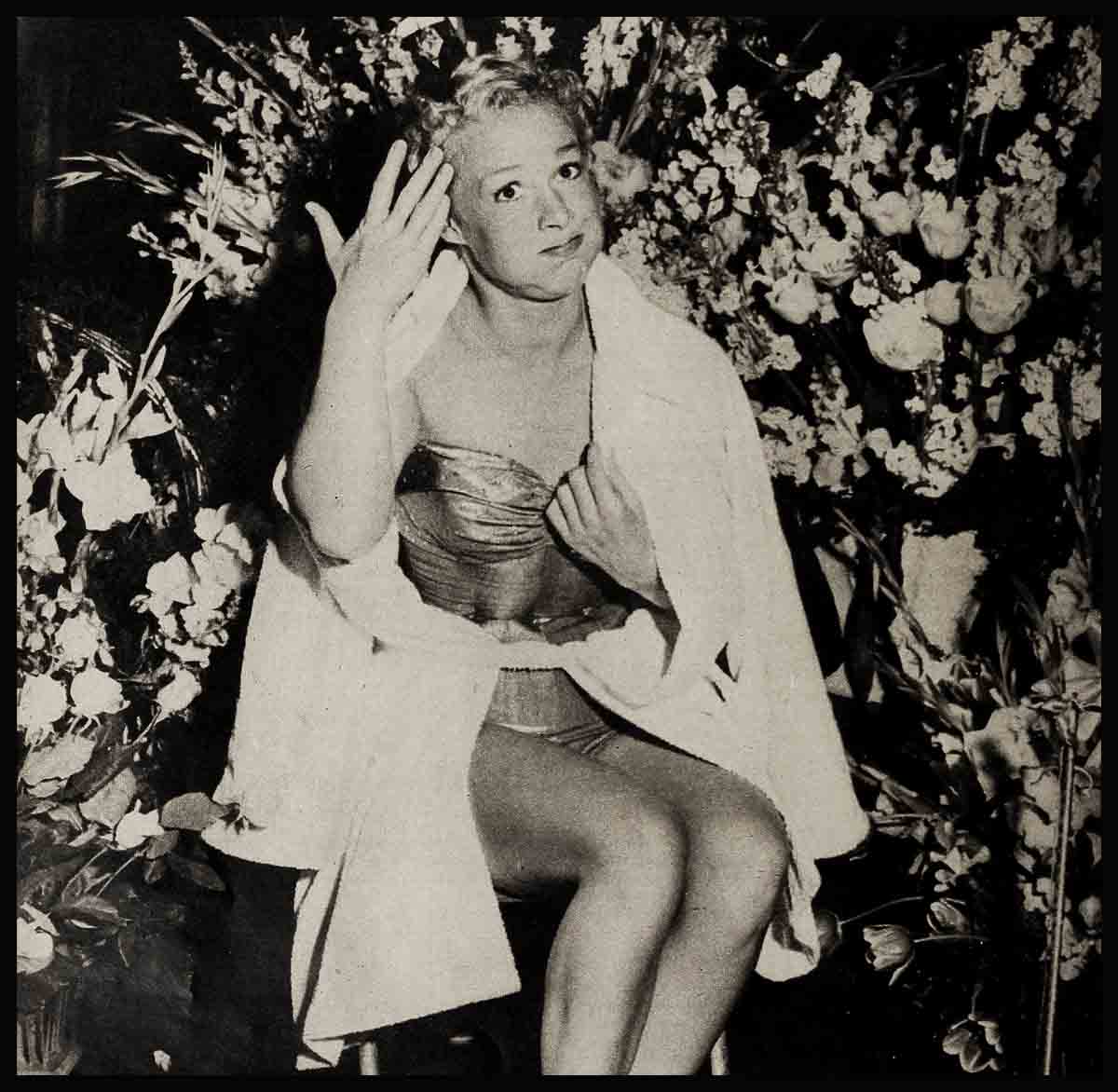
Miss Show Business—Betty Hutton
It was 1933. The house lights in the Detroit theater were dim, and the spotlight circled the group on stage. The master of ceremonies was holding his hand over the head of a small dark-haired girl who had just finished a tap dance in the nightly amateur contest. The applause was thundering. Then he moved his hand over the head of the skinny blonde kid who had sung “Somebody Loves Me,” and the response was equally deafening. The master of ceremonies shrugged and smiled. “Ladies and gentlemen, it looks like a tie.’ He returned a dollar bill to his pocket, pulled out two 50-cent pieces and presented one to each child. The freckled blonde stood immobile, biting her lip in fury. Then she walked deliberately over to the other girl and gave her the half dollar.
“I wasn’t being sweet, I wasn’t being generous,” says Betty Hutton now. “I just didn’t want any part of second money.”
This is perhaps the whole secret of Betty’s drive and determination to be the world’s greatest entertainer. She isn’t happy unless she comes off with top honors, and in the past few years she has seldom finished anywhere but first.
Last April she was once again a winner when she was presented with a plaque by Major General William Kean in recognition of her work in entertaining troops on the Korean front. It was the first such award to be given and orders for its presentation came from Secretary of the Army Frank Pace, Jr. The other who went before her had done a magnificent and highly appreciated job, but when Betty went, she blew into Korea like the scream of a siren, bombarded them with songs until they were in a happy daze, and then left like an explosion. The reverberations of her superb performance reached Washington, D. C., with such a resounding thud that the brass hats were moved to give some concrete evidence of their appreciation.
That Betty made such a hit is no accident. When she is on stage, whether it be the dais of one of the world’s plushier theaters, or a platform of crude boards erected on a windswept and frozen plain, she works on her audience with the precision and determination of a skilled surgeon. She knows her audience, feels it like the throb of her own heart, and if there is one person present who has not yet been won over to her she will go on working and sweating until that one laggard has succumbed to the Hutton hoop and holler and is blistering his hands in appreciation of her talent.
To Betty, an audience is like a conquest in love. She is never truly happy, in her own sense of the word, unless she is on stage and sensing the great warmth that pours over the footlights. She has never let an audience go until she has known that she has won, known that they love her.
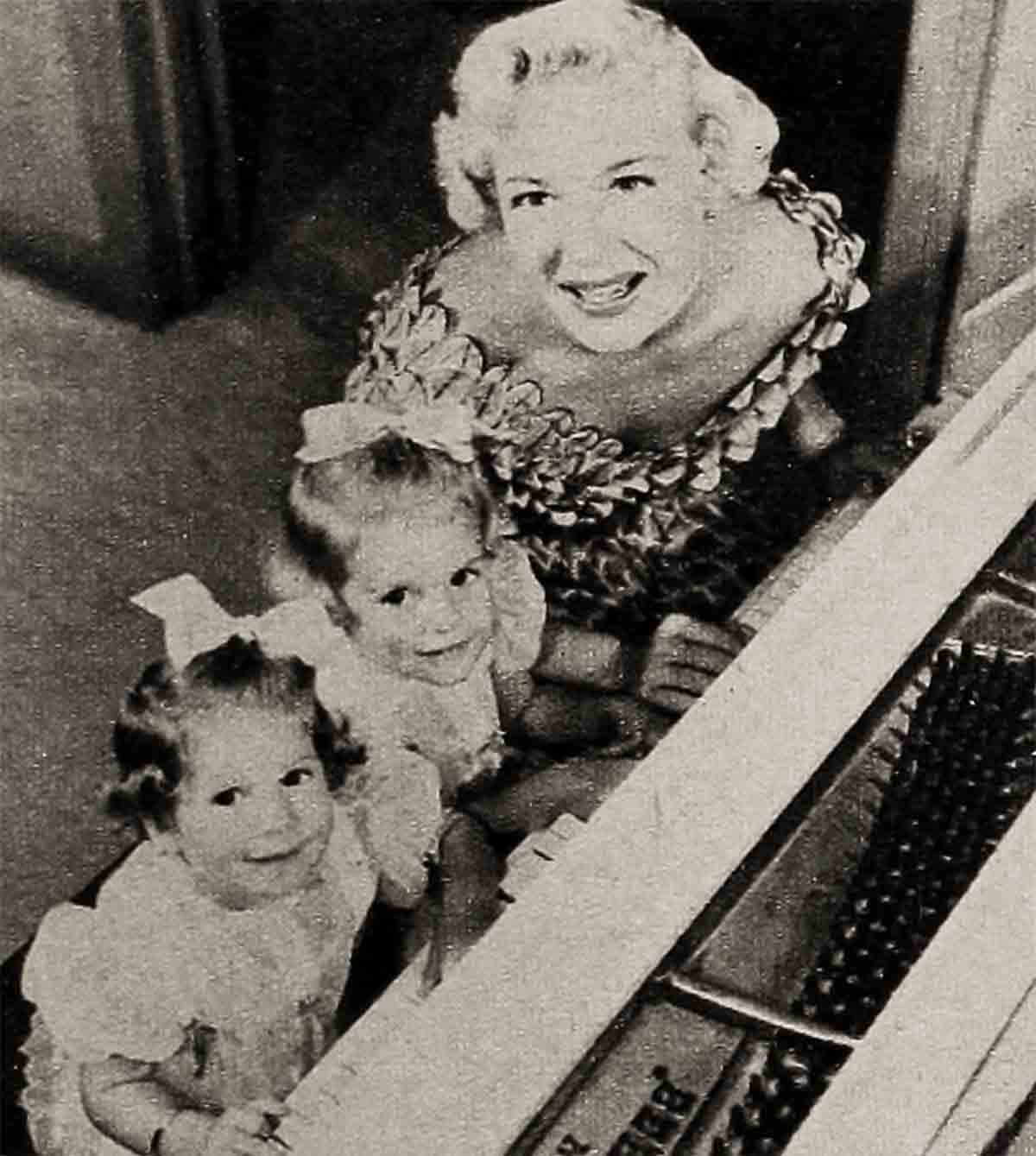
The audience is seldom aware of her intensity. They know only that they are being entertained as they have never been entertained before. They are unaware of her exhaustion. Few know that in the wings of the stage, waiting for Betty, are always a straight chair, two glasses of water and a large towel. Betty will come off dripping wet, fighting for breath, and sink into the chair. Those who watch her post-performance for the first time, want to call a doctor. Her face shows the strain, her breathing comes in quick little gasps, and it is always a couple of minutes before she has the proper control to drink the water, then take the towel and mop herself from head to foot.
Why does she put herself through such a tortuous ordeal? Because she loves it, because it is her whole life.
People are slow to fathom the myriad talents that make a great performer. They take it for granted that Betty Hutton earns her living merely by singing songs, sometimes by a few accompanying aerobatics. They are pleased by her energy, by her vitality. In May, Betty finished up a four week stint at the Palace Theater in New York. She did two shows a day and in each she was ‘on’ for two solid hours, singing her heart out, seemingly never touching her feet to the stage. Audiences felt drained just watching her, and when they were sure she must be too tired to move another step, she brought her act to a close by swinging out over the audience on a trapeze. The Palace engagement was her first real starring show on Broadway, and it was then that people began to know there is more to Hutton’s act than singing a song and “a few acrobatics.”
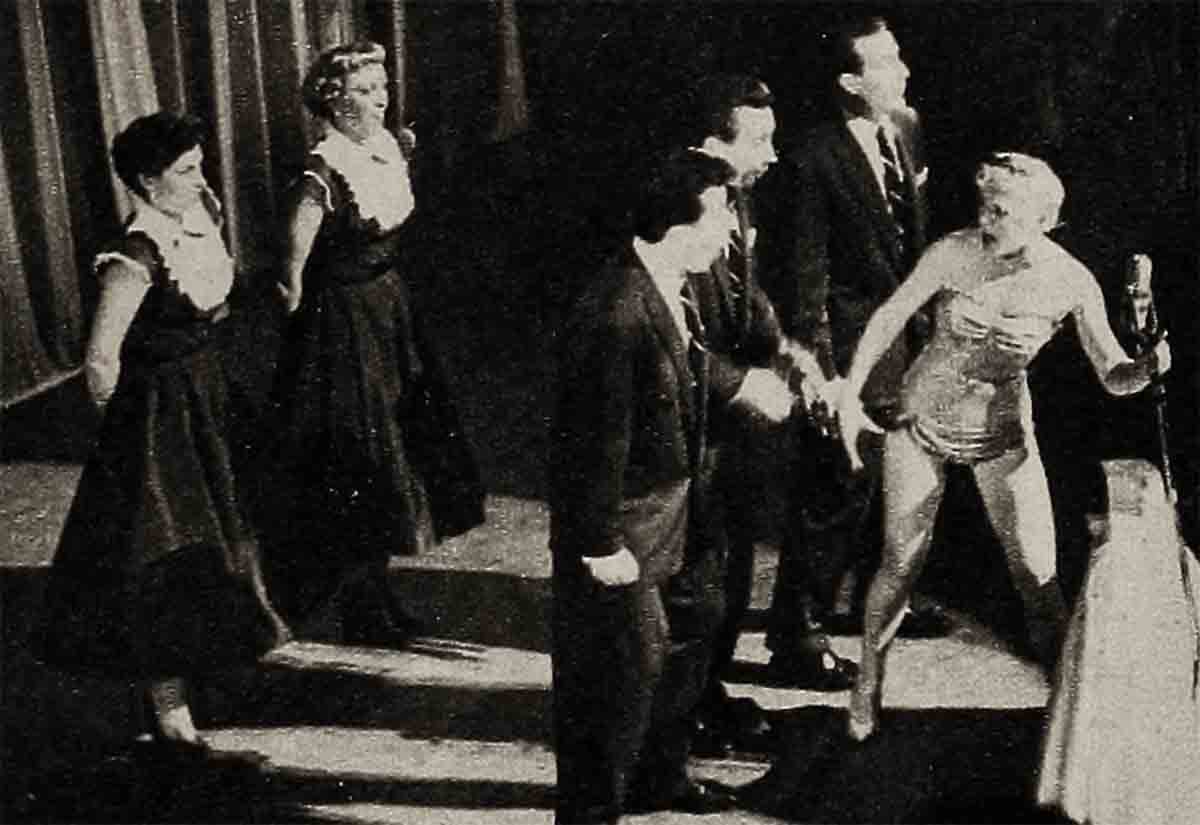
There is a great deal more. Betty knows show business from top to bottom and inside out. She knows lighting, costuming, orchestration, stage decoration, every facet of it, and she knows when to come on stage and how, what to do while she’s on, and how and when to leave. She knows contracts and their legal points as well as a corporation lawyer, and Abe Lastfogel, who has been her agent since she was a $75-a-week singer, brags that Betty is the smartest client he’s ever had.
When she was only three she sang in the blind pig operated by her mother in Lansing. She sang primarily for the money, but she also sang with the determination that one day she would be a headliner. When she was barely old enough to remember lyrics, she began picking up hints from the customers.
“Hey, kid, can you do a soft shoe routine?”
“Here’s my hat—wear it on the side of your head. Like that—that’s got it.”
From speakeasies she went to street singing. She’d sing anywhere there was a crowd and take the nickels and dimes home to Mom. Her sister Marion called a halt when it came to warbling on the streets—she felt it was too improper. But Betty didn’t care. They needed the money, and she needed the experience. She used to plague her mother to take her into beer gardens, dance halls, any place she “could get training.” She knew, even then, that this was to be her life and she had to prepare herself for it.
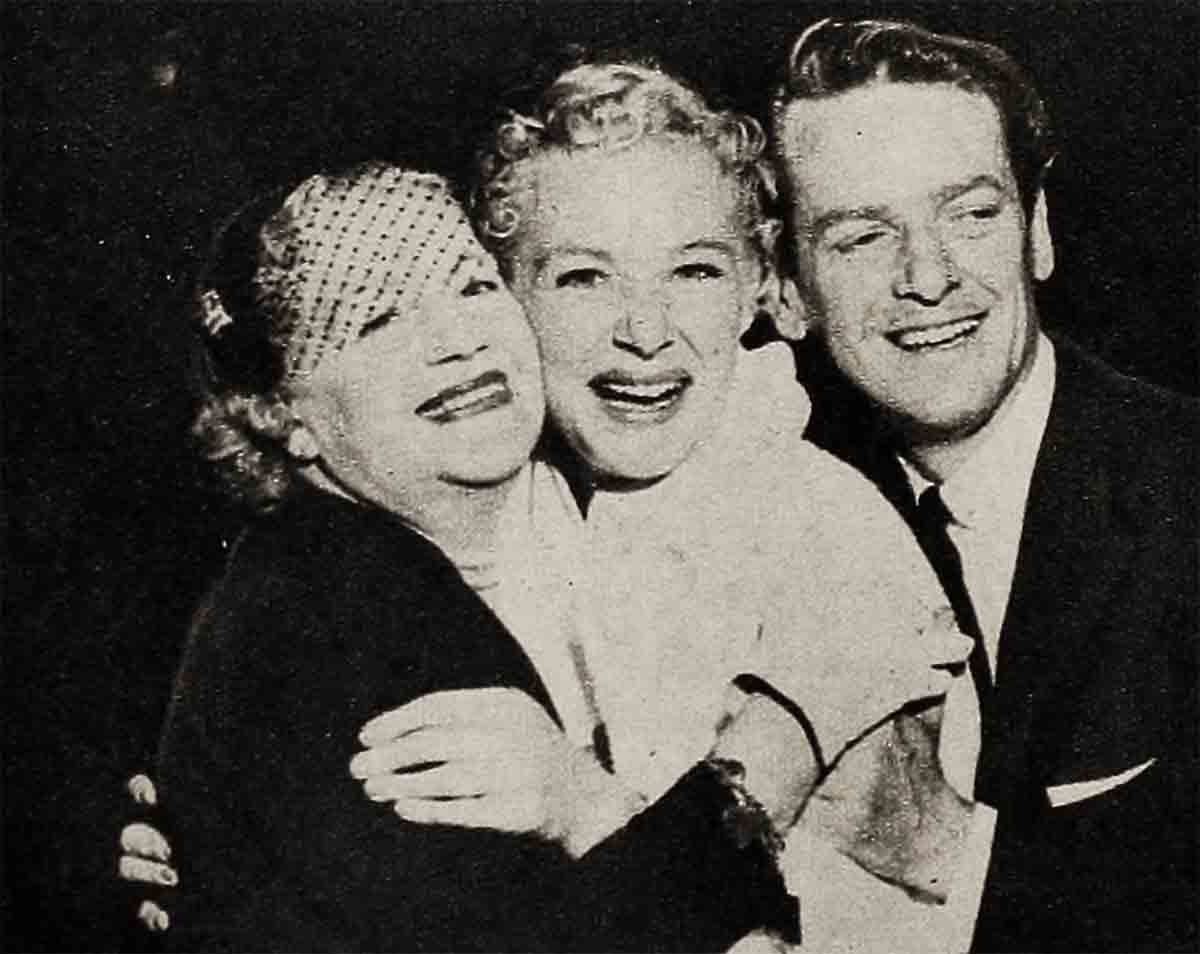
Mabel Hutton moved with her daughters to Detroit at the time amateur contests were sweeping the theaters of the country, and Betty promptly entered every one held in the area. It was there she learned about booby traps. Many of the theater managers considered it hilarious if the contestants were showered with water or pelted with tomatoes, and proceeded to install Rube Goldberg gadgets destined to upset the performers. The first time Betty met up with one of these assaults she held back the stinging tears and went on with her act as though nothing had happened. But they never caught her again. After that she ‘cased the joint’ a week before the contest and learned how to outmaneuver the contraptions. Her agility at ducking got even bigger laughs than the direct hits scored on other contestants.
With Vincent Lopez and his band she learned more. She had sung sweet songs in a sweet manner until the night she heard Lopez decided to fire her, and then for the first time she went into the gymnastic gyrations that have since become famous as the Hutton trademark. She assaulted her audience and they loved it, and Betty learned the value of surprise. She began wearing what is still her basic costume—a large bouffant skirt, a high-necked bodice with a prim Peter Pan collar and large flowing sleeves. She’d sit quietly in front of the band, with folded hands and a quiet smile. The people who noticed her would think how like a blonde angel she looked. When her cue would come she’d float to the microphone and sing the verse of her song in soft and wistful tones. Then, suddenly, Betty would let loose on the chorus with a screaming attack that rocked the audience back on their heels.
But it wasn’t enough for Betty. Although she had gone every day for a year to watch vaudevillians at local theaters, studying their techniques in getting on and off stage, she felt she must know more. When later she worked at the Casa Manana, the headliners were such people as Lou Holtz and Helen Morgan. Holtz, a dynamic showman himself, taught her how to swing on stage via the curtain, and Helen Morgan helped her with her hands. Betty had never known what to do with her hands, felt they were awkward, and admired the daintiness of Helen Morgan. Even later, when she went to Hollywood, Betty kept learning. Blossom Seeley taught her how to ‘work small,’ during the filming of Somebody Loves Me, how to take smaller steps, work her whole body more tightly, and in. recent years Betty has adopted much of this technique which is more suitable to her current style.
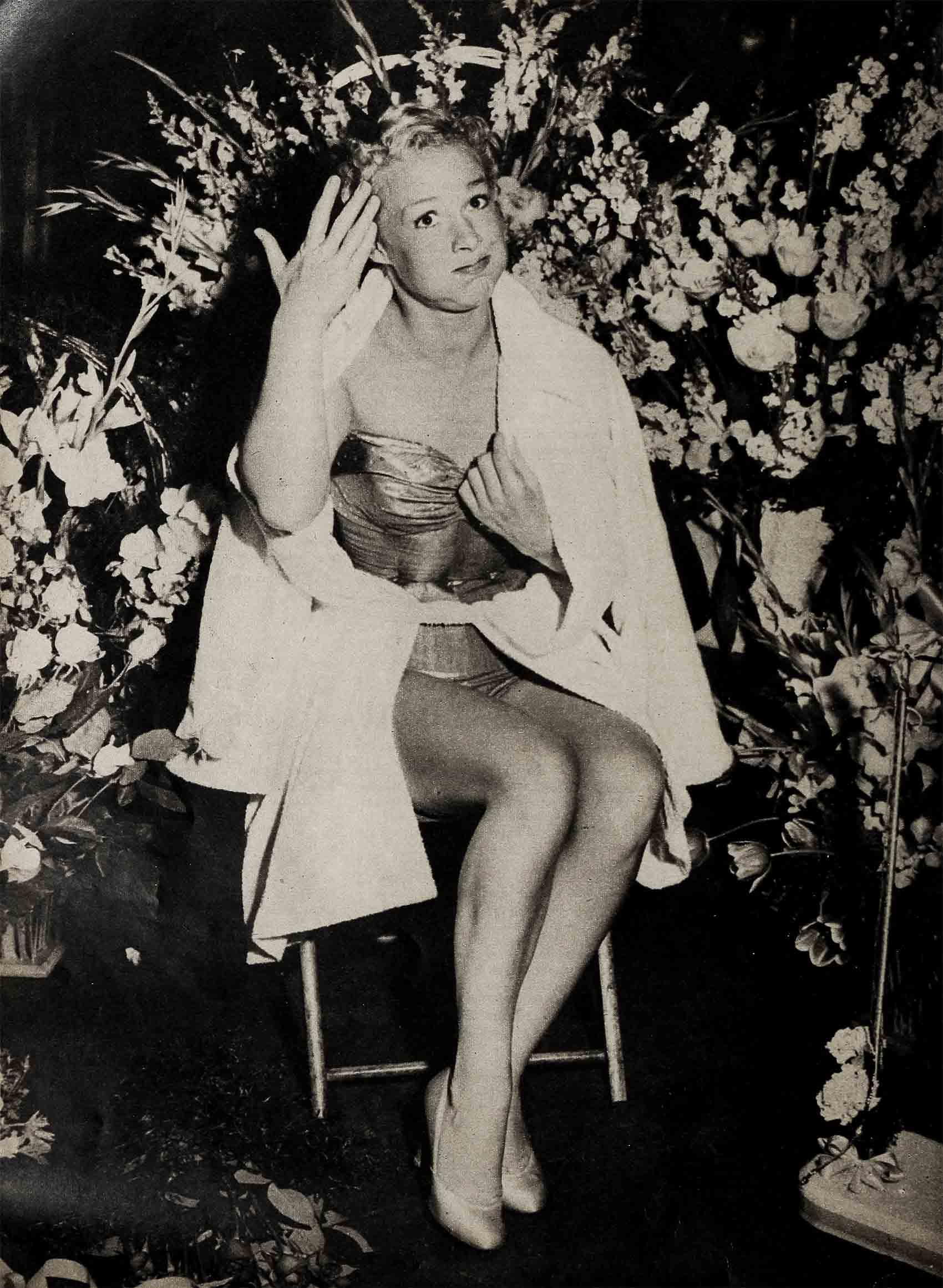
Nothing Betty Hutton does on stage is an accident. Her smallest gesture is studied. For her recent show at the Palace she supervised the draping of the stage, the orchestral arrangements, and in short, produced the whole show. Her costumes were basically the same as those in Korea, although much more elegant for New York. She made her costume changes on stage, with two members of the Skylarks holding a cleverly designed wraparound skirt in front of her, curtain style. In Korea she had done the same thing, only with a much simpler skirt. She had worn her own ski clothes there, knowing the boys wanted her to be attractive and not hung with a dreary fatigue outfit. She stripped down to a leotard for them, despite the sub-zero weather, and sang so loud they forgot their surroundings.
She knows the importance of clothes, and changes them deftly to suit her style. She has abandoned the adolescent curls and now wears her hair in a braided chignon through which she weaves yarn or flowers. She decries the habit of girl singers wearing sexy clothes. “It isn’t right for show business,” she says. “You come out looking sexy and right away you’ve lost every woman in the audience. Win the women first, then you’ve got the men.”
If Hutton has a good audience she gives them a great show, but if she has a tough audience she pulls out her bag of tricks, determined to get them in her lap if it is the last thing she does. She swings on the curtains, topples the microphone, runs through the audience, takes pratfalls, makes somersaults, tears up the music, runs through the entire orchestra kissing the musicians (nimbly avoiding the instruments, which could easily trip her into a bad fall), and if all else fails she will grab the band leader and throw him across the stage. Once she shot off the boards and landed on top of the drummer in the pit. She is just as violent with others as she is with herself. Bob Hope’s teeth caps once went flying across the stage as a result of a Hutton backslap, Eddie Bracken was tossed over a bar in a movie scene, and actor Frank Faylen was knocked out cold with a right to the jaw when a director demanded realism. Danny Kaye and Betty once did a show together in which she was required to give him a series of hearty shoves. “I could have killed that girl then,” he says. “She had so much energy that I finished up like a limp rag.”
Despite her RPM record, Betty has never sustained the slightest injury during her brisk workouts, a fact which adds up to a small miracle because she is continually risking her life and limb. She must necessarily keep herself in excellent physical condition and it has become almost a fetish with her. She conscientiously eats a strictly balanced diet and when working, is in bed every night at eight o’clock. The times she allows herself the luxury of being a night owl at clubs or restaurants are so rare that she talks about them for weeks, afterward.
One of Betty’s favorite evenings, a few years ago, was being hostess at dinner to Fannie Brice and Sophie Tucker. There is nothing she would rather talk about than show business, and she let her dinner go almost untouched while listening raptly as Brice and Tucker spun their yarns of bygone days. It is safe to say that while Betty was listening, she was also sponging ideas from the two veterans, for she is too anxious to learn, even today, to let any bit of information drop out of sigh and mind.
Despite her unfinished formal schooling and her preoccupation since with the entertainment world, Betty meets people well, and has remarked that the greater human beings are always the simplest people, the easiest to talk to. When in Korea she was charmed by General Ridgway, and Mrs. Ridgway gave a tea for her. Eight years ago, on a vacation at Camelback Inn, she was introduced to the president of Encylopedia Britannica, who was there with his family. When he asked her to join them for dinner Betty had understandable qualms about talking with such a brilliant man, but it turned out that he cornered her in conversation for hours on end that evening. She couldn’t comprehend why he should want to talk to her, even though he spent the rest of his stay at the inn telling other guests about Betty’s fabulous life and razor-sharp intellect.
Toward the end of the war she met General Eisenhower in Washington at a Birthday Ball.
“I’m so happy to meet you, at last,” he said.
Betty was astounded. “Why?” she said.
He told her then that he had been so fond of Miracle Of Morgan’s Creek that whenever things were going badly and he was depressed he saw the picture, and that after at least a half dozen times he still felt it was the only thing that could give him a lift, make him feel that things weren’t so bad after all. That sank into Betty’s heart with a gratifying warmth. What other business in the world gives so much to so many, and has a chance to lift the spirits of even such wise and esteemed men as Dwight Eisenhower?
Show time hasn’t always been a happy time for Betty. There was the summer she was 14 and went to Louisville, Kentucky, with a newly formed band. The orchestra leader took the week’s pay for the band and left town, stranding Betty and the boys with insufficient funds for their next meal, let alone train fare home. If it hadn’t been for the wealthy tobacco family who had been: frequent customers of Louisville’s Chez Paris and had fallen in love with Betty, there is no telling what may have happened. The Hill family took her home with them to their big house and cared for her until Mabel Hutton was sent the train fare to come and claim her deserted daughter.
There was the benefit show at the Los Angeles Shrine Auditorium, a mammoth place whose farthest seats. almost prevent sight of the sage. Betty’s act is a visual one, and she knew it was going to be tough. “Nobody’s going to be enchanted by my gorgeous voice,” she said. “They’ve got to see me.” That was the night she had to empty her bag of tricks, ended by throwing the band leader around like a rag doll and then almost collapsed from exhaustion in the wings.
There was the show at the Hollywood Bowl at the beginning of the war. The Bowl is a junior Shrine Auditorium when it comes to size, and Betty knew she’d have to depend entirely on its magnificent acoustics. Even these failed, for just as she went on a score or two of army planes flew low overhead, drowning out the slightest hint of even Hutton’s voice. By the time the last plane had droned out of sight the first one was back, roaring through the sky. Betty made a few well chosen cracks into the microphone but they were lost in the uproar, and there isn’t enough money in the world to get Hutton back into the Hollywood Bowl.
It was one of the few times she had to release her audience without giving them the full treatment.
Three years ago she was booked for seven shows a day at San Francisco’s Golden Gate. Her voice was not in condition for such a strenuous workout and after two days and 14 shows her vocal cords weakened to the point that she could scarcely sing. At the beginning of her next show she sang one song and knew then it was impossible to go on. She stepped to the front of the stage. “Ladies and gentlemen, I’m sorry, but my voice is gone and I can’t sing another note. you’ll be patient I’ll have them play my recordings backstage and Ill mouth the lyrics. I’ll give you the works with it,” she grinned, “but I won’t really be singing. Any of you who want your money back can get it at the box office.” Not one person left, and all sat spellbound through the rest of the show.
Korea was tough, too, but in a different way. She and the Skylarks did two hows a day, flying from place to place, ever singing for less than 10,000 men and ever more than two miles away from the hooting. Twice she sang in the front lines and was amazed that, somehow, she wasn’t scared. Knowing that Betty would appear in scant clothing despite the bitter cold, the boys rigged up electric heaters and some even found a way to blow warm air over the stage during the act. The troupers washed their hair in soldier’s helmets and fined each other a dollar for griping. Betty took more pictures of the boys than they took of her.
There have been many happy times. Playing for an enthusiastic British audience, at the Palladium in London. They loved her and came back night after night to shout the same requests up to the blonde tornado on stage. When she returned to Hollywood she was full of gratitude for the English and couldn’t stop talking about it. One day when she was spilling over at lunch, Eddie Cantor came by and sat down to listen. She explained to him that she had thought they would be a tough audience, but that she had found them the best. Cantor picked up a fork and ran its handle along the tablecloth. “They would love you,” he said, “because you are showmanship. It’s something they understand. To them you’re like Gracie Fields.”
Cantor has said that Betty Hutton is the only girl of her time who is equipped for what she is doing. “She has all the tricks of the old timers,” he says. “When we came up it was an art, but she came up the rough way, clinging to the edges of a dying vaudeville and learning what she could.”
When Betty is not working she putters around the house and garden and plays with her children, but if there is a prolonged dry spell without actual work she becomes restless and moody. Even though she goes to bed early she is plagued by insomnia—from restlessness if she isn’t working, from excitement if she is. Her mind goes too fast for idleness and there isn’t a lazy bone in her body. She can’t stand to be in bed after seven-thirty A.M. and when on tour gets up and wanders around, hoping some of the others will soon be awake. She and Charles O’Curran had been planning a wedding for some weeks, waiting for a convenient time, but there never seemed to be such a time. Betty was always busy. So after returning from Korea on a Friday, she married O’Curran on the following Monday, despite the fact she had to immediately go to work planning her appearance at the Palace. Even though she rehearsed every day with a bad abscess in the back of her throat, a result of the exposure to the Korean winter, she made further plans to make Topsy And Eva for Paramount when she returned from New York, then to do a return engagement at London’s Palladium after the movie was finished.
If Betty isn’t actually working, she is plotting work. She had always wanted to work for Cecil B. DeMille, and was delighted when she was given the role of the elephant girl in The Greatest Show On Earth. She remained delighted until she learned that the role of Holly was a better one, and then she spent a round 1,000 dollars for a floral piece to be sent to Mr. DeMille. It was a circus scene made of flowers and the figure of Holly, the aerialist, was made entirely of orchids. When DeMille took the expensive hint Betty was delighted and everybody else thought he was out of his mind. This included veteran circus people, who know that ‘fliers’ begin training at the age of three in order to condition their muscles for the profession. At the time, Betty was 30.
Undaunted, she went to work with Antoinette Concello, one of the world’s most famous fliers. For long weeks they worked on a trapeze rigged 24 feet above a studio sound stage. It was rough, tough, bruising work. Betty learned how to hold on with hands, feet, fingers and toes, how to swing through the air and connect, with a searing wrench, with another flier. She learned how to fall into a net, a feat which requires great skill or otherwise delivers a broken neck. And she learned ankle drops, day after day falling backward off the trapeze, catching her whole weight by the back of her ankles.
Betty’s first real test came when she went to Philadelphia to make her first try under the big tent of Barnum and Bailey. Her maid Mary went along, and Antoinette Concello and Mr. DeMille, and there were also 10,000 people there—and the circus folk. As Betty entered the big tent the circus people were standing quiet as statues, with folded arms and dubious expressions. Betty looked up, to find her trapeze, but couldn’t see it.
“You’re not looking high enough,” said Antoinette. “This is the circus—not a sound stage.”
Betty looked up and up and up and finally saw it, hanging 60 feet above the ground. “Dear God,” she prayed.
Antoinette went up with her, and as the two of them stood on the tiny square board beneath their feet, the only reality in the world of air about them, Betty Hutton felt real fright. She looked at Antoinette. “I can’t,” she said for the first time in her life. “I can’t do it.”
“If you don’t,” said the circus-wise Antoinette, “I’ll push you. So help me, I’ll push you off.”
Betty looked down. There was a maze of faces and bright lights. There was dear old Mary. And DeMille, looking up with a smile. “Dear God,” Betty prayed again, took a firm grip on the bar and was off through space, the air singing in her ears. She went through her act, made a perfect drop into the net, and for a stunned moment there was a silence, so profound you could sense its pulse. Then a thunder of applause echoed through the big tent, and the circus people, who knew they had just seen the miracle of their world, were clapping as though they could never stop.
That is Betty Hutton. She went on to steal the show from The Greatest Show On Earth, and although after each trapeze act she quaked at the thought of what she had dared, she later decided to fly once more at the Palace. And once the decision was made, she began chafing because the theater’s stage was not high enough to allow for something more spectacular.
Spectacle is her meat. When she went en a wartime bond tour to Chicago, she and the others were piled into slow moving cars that eventually were to reach the reviewing stand which seated the city’s mayor. Betty sat and chafed at the ridiculous pace of ten miles an hour until she could stand it no longer. She leaped out of the car onto the back of a motorcycle officer and gave him directions to forget the parade, full speed ahead. When they skidded to a stop before the reviewing stand Betty vaulted into it and planted a kiss on the forehead of the astonished mayor. She was first again, and the papers were full of it the following day.
That was show business, and Betty knew it. She will never give it up. “When I get too old for the cameras I’ll hit the nightclub circuit. I’ll spice up the lyrics and I’ll be another Sophie Tucker.
“I’m no movie actress,” she says with blazing and prideful eyes. “Me—I’m a performer!”
She is beyond all doubt Miss Show Business of this century, and it is improbable that any future century will bring forth another such entertainer—a girl who acts like a pile driver broken loose from its moorings, yet who can bring laughter or breathless tenderness to a song.
THE END
—BY JANE WILKIE
It is a quote. MODERN SCREEN MAGAZINE JULY 1952




